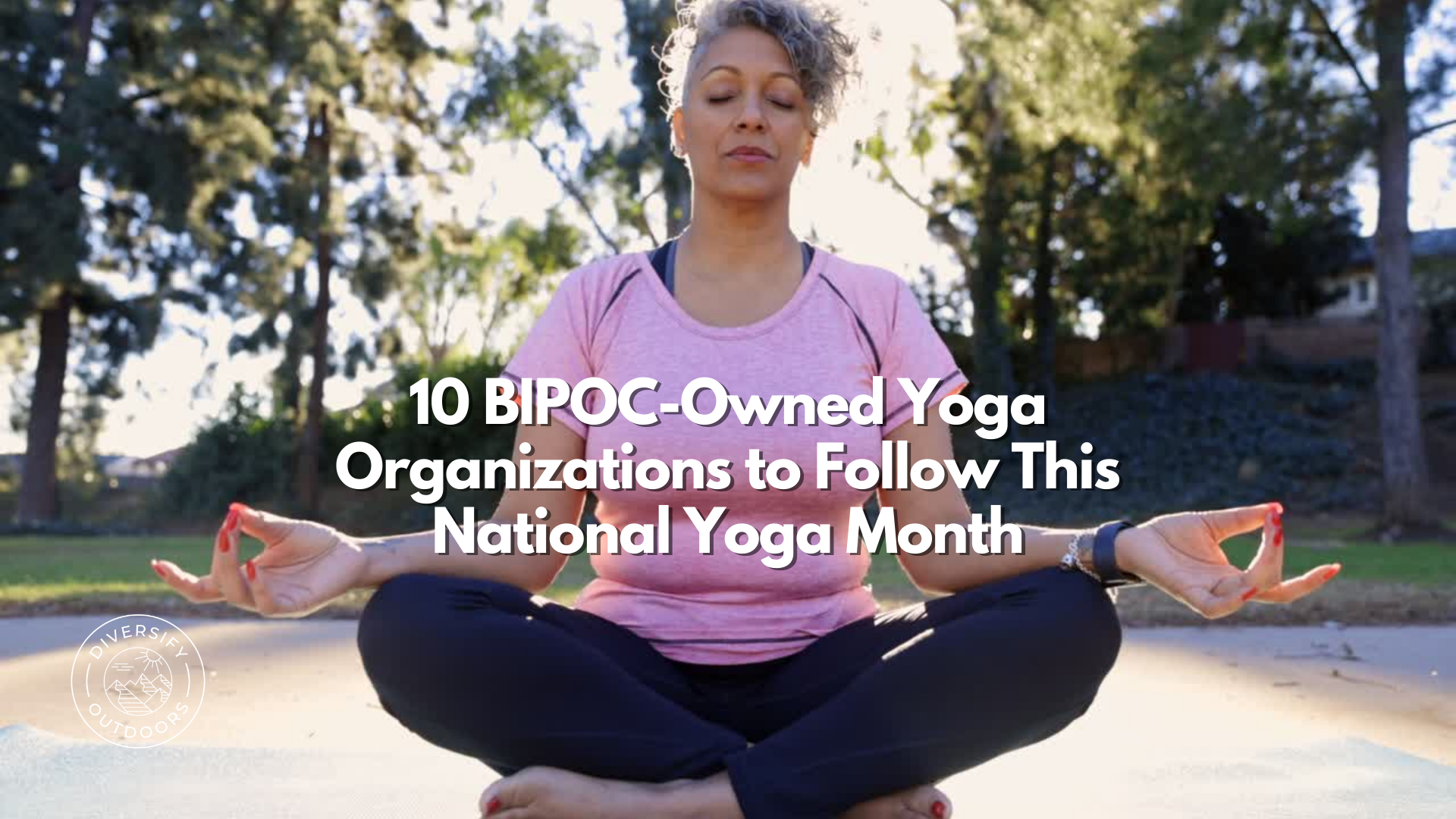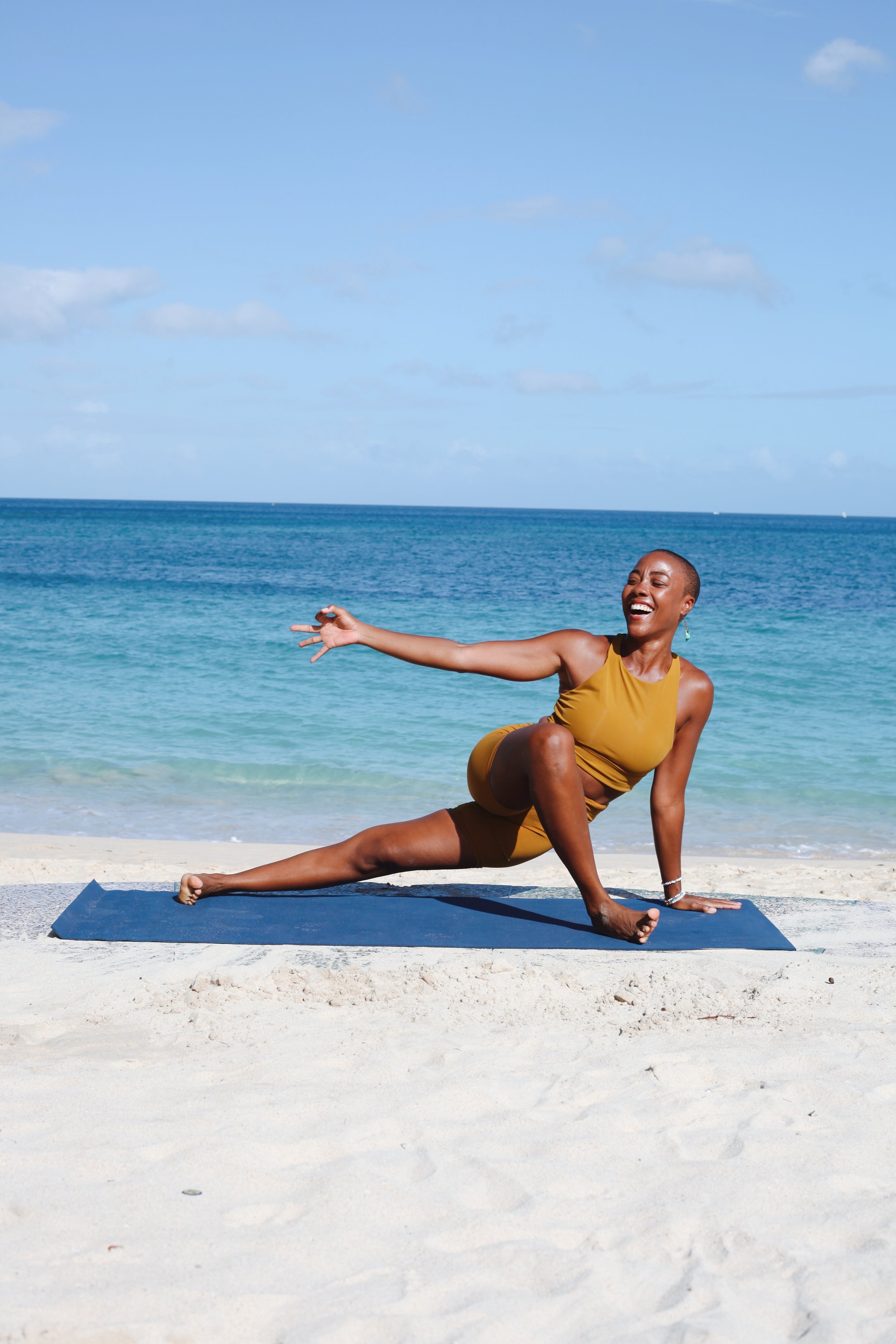10 BIPOC-Owned Yoga Organizations to Follow This National Yoga Month
Photo: Canva.com
Yoga can be an enriching tool that many use to improve their mental, physical, and spiritual health. Outside of the body, yoga can help foster deep relationships and build community. However, the people who are most seen practicing yoga in popular culture often fit a certain demographic; white, thin, young women. Stepping into a yoga space as someone who does not fit that demographic can be an isolating experience. Fortunately, that culture is beginning to change.
As part of National Yoga Month, we want to recognize BIPOC-led yoga organizations and individuals that are breaking down barriers and increasing the accessibility of yoga for all.
Native Strength Revolution
Founded by Kate Herrera Jenkins, Native Strength Revolution (NSR) is a non-profit collective of Indigenous yoga instructors from all over North America. NSR offers free, beginner friendly yoga classes that address spiritual, mental, and physical health. According to NSR’s mission, they “create relationships and collaborate with Indigenous communities and organizations to educate, elevate and uncover a new possibility of wellness for Indigenous people.”
NSR provides continuing education opportunities for Native Yoga teachers and lead trainings specifically for Indigenous people. Classes and trainings are offered virtually, making them widely accessible. They will soon offer a 300 hour training course called “Yoga Alliance School”. To learn more about classes and teacher trainings, visit their website. Make sure to follow Native Strength Revolution on Instagram to stay up to date on upcoming programs.
Bridges Through Yoga
This yoga studio holds space for all people to explore and experience yoga in a judgment-free environment. The space allows for folks to come together and release themselves from the causes of suffering. Their classes use yoga as, “a tool to discuss racial and social justice and promote healing, incorporating all the facets of yoga: philosophy, postures, breathwork, mindfulness and meditation.”
The founder of Bridges Through Yoga, James, has been practicing for over ten years. For him, yoga has been a source of healing. Along with overcoming traumas, he uses his studio to facilitate important conversations about race. He seeks to create an inclusive environment that is welcoming to all and uses yoga as a tool for healing and racial justice. James completed his 200 hr E-RYT yoga teacher training at the Himalayan Institute in Honesdale, PA.
You can practice more with James at One Yoga in South Minneapolis, Minnesota.
Red Clay Yoga
Red Clay Yoga facilitates learning, teaching, and community outreach through yoga, while focusing on youth, marginalized communities, and their allies. Chelsea Jackson Roberts, founder of Red Clay, studies the experiences of Black teen yoga practitioners who use yoga and storytelling as tools to teach literacy development.
This studio, located in Atlanta Georgia, is guided by four major components:
Training:
Red Clay Yoga offers workshops, classes, and certifications for people of all ages. Trainings focus on the needs of underrepresented communities by emphasizing culturally responsive methods of practicing yoga with youth.
Community Engagement:
Red Clay Yoga interacts with the community by providing yoga classes for schools and community organizations on-site. They work with parents, educators and administration that are interested in learning how yoga can be used for teaching and learning.
Restorative Justice:
Yoga classes use restorative justice tactics to facilitate discussions.
Literacy:
A literacy component is added to Red Clay Yoga’s practice to help deepen awareness of the many experiences shared within communities of practice.
If you’re in the Atlanta area, be sure to check out one of Red Clay’s classes.
Yoga 4 A Good Hood
“Being in this space has finally allowed me to find healing, and although I know this is step one; Yoga 4 A Good has given that to me and I am extremely grateful”
Located in Rochester New York, Yoga 4 A Good Hood’s mission is to create a space of healing for people of color and individuals with low socioeconomic status through yoga. The group of founders find that for many, yoga is an unattainable practice. By reaching these communities with yoga, they hope to aid in addressing issues of brokenness, hardship, abuse, and self-degradation.
Yoga 4 A Good also has teacher training. Their next training begins November 5th and there are scholarships available for BIPOC/QTPOC and the deaf community.
"Being in this space has finally allowed me to find healing, and although I know this is step one; Yoga 4 A Good has given that to me and I am extremely grateful" - Yoga 4 A Good Hood Website
Watch Yoga 4 A Good Hood tell their story on the TEDx stage here.
Root3d
Root3d is a wellness center founded by Rachelle Pean and Jamel Mosley to center the liberation, healing, and power of BIPOC folks through the mind, body, and spirit. They seek to create a safe space where people can show up as themselves. Their classes include yoga, movement, and support circles that are both virtual and in-person. Wellness workshops are organized to give participants space to connect deeply within oneself and build tools to embark on a healing journey. On-site therapists and healers also customize sessions for individual needs.
Root3d offers additional emotional support resources outside their team with this database of healers that identify as Black, Indigenous, and/or People of Color.
Community engagement is important to Root3d. They host pop-up poetry nights at the center and with community partners in the Albany NY area.
The Tree Yoga Cooperative
The Tree Yoga Cooperative is a BIPOC-owned yoga school and wellness hub in Los Angeles, California. Its founders, Rita Ortiz-Contreras, Jonie Cole Thomas II, Jana Janelle Johnson and Jenni Alvarez established this cooperative to be a hub of holistic wellness and community support. The creation of this group was motivated by a variety of personal experiences, like not seeing yoga in their neighborhoods growing up, not seeing people that looked like them practicing yoga in the mainstream, wanting to embrace people with different cultures and backgrounds, and healing from trauma. Now, they focus on education and empowerment through yoga.
The group engages in social justice activism through providing community support to frontline justice warriors including educators, mental health providers, formerly incarcerated people, and more. The Tree Yoga Cooperative connects people to resources and educates about grassroots policy efforts. They invite like-minded organizations to connect with them to help understand each other's services and social justice work.
612 Jungle
“I knew that I could reach certain people in my community, people that look like me, that had never had the chance to experience yoga”
Gabrielle Roberts (she/her) is the founder and owner of 612 Jungle, Minneapolis, Minnesota’s first and only hip-hop yoga studio. Gabrielle wants to make yoga accessible, relatable, and empowering for everyone through a soulful approach to the practice. She uses music to help establish the important connection people find with each other. “I knew that I could reach certain people in my community, people that look like me, that had never had the chance to experience yoga,” said Roberts.
Roberts didn’t always find joy in yoga. She said that she disliked the first yoga classes she went to because she was the only person of color, it was hard to follow along, it wasn’t accessible, and she did not feel a sense of connection with people. After she started her yoga teacher training and doing daily and consistent meditation practice, she noticed a difference in herself and found a new appreciation for life. “I just felt a way that I had never felt before,” said Roberts. Now, her studio and yoga school offers that accessibility and relatability to others.
Michelle Cassandra Johnson (she/her)
Michelle Johnson (📸: Jodie Brim)
Michelle Cassandra Johnson works at the intersection of justice and yoga. She describes herself as an activist, social justice warrior, author, anti-racism consultant and trainer, intuitive healer, and yoga teacher and practitioner. She teaches workshops in yoga studios and community spaces nationwide that focus on healing from trauma, coming back into wholeness and aligning the mind, body, spirit and heart.
Johnson said that most of her yoga is done off the mat. Along with her yoga practice, she connects her clients to social justice topics and also facilitates race-equity training. To overcome injustice, she said that it takes a lifetime of learning and unlearning. “Creating conditions for justice is ongoing. Because we have been dealing with injustices for so long,” she said. Yoga, Johnson says, is an avenue to connect people and overcome systemic issues.
Johnson is the author of two books focused on the intersection of justice, healing and yoga; Skill in Action: Radicalizing Your Yoga Practice to Create a Just Word and Finding Refuge: Heart Work for Healing Collective Grief.
Black Yoga Teachers Alliance
“Yoga is becoming a way to express justice and also to find healing within traumatic experiences that have been plaguing our community.”
Charlene Muhammad (📸: Jodie Brim)
Maya Breuer and Jana Long founded Black Yoga Teachers Alliance (BYTA) in 2009. Their objectives are to amplify their presence and voices in the world, create a network of black yoga teachers, connect black yoga teachers with opportunities to train, teach and travel, and increase the diversity of people who teach and practice yoga.
Charlene Muhammad (she/her), the secretary for BYTA, says that yoga offers another journey of self-expression for black yoga teachers. “As more black and brown folks of color have embraced yoga they also have been pushing back this concept that yoga is for a specific demographic and physicality,” she said. “Yoga is becoming a way to express justice and also to find healing within traumatic experiences that have been plaguing our community.”
World peace is important to BYTA. They offer a customized training called Yoga As A Peace Practice that teaches restorative practices that increase resilience, inner peace and well-being in individuals, families and communities.
Certified yoga teachers and people enrolled in yoga teacher training programs are eligible to join BYTA for a variety of benefits to support your yoga practice.
Sara Clark (Sara Clark Yoga)
Sara Clark (📸: Mia Benjamin)
Sara Clark (she/her) is a yoga, meditation, and mindfulness teacher with 12 years of experience. Originally in television post-production, Clark said felt like she didn’t belong in corporate America. “Yoga called me into the world of teaching,” she said.
Clark has taught yoga around the US in hubs like Los Angeles and New York, and has also spent time teaching around the world as a Lululemon Ambassador and leading retreats. Her Vinyasa practice focuses on using breath to honor the cycle of life and to show up as fully as possible.
She spoke about how special it is that she can reach a global audience, especially in a wellness space dominated by white women. “To be on a global platform as a black yoga teacher has been pretty profound and I hope to see more of that for others that look like me,” she said.
Clark said that yoga can provide the tools we need to overcome human suffering and difficulty by sitting and breathing and being witness to your breath. This allows “the human mind and ego to step to the side to witness having the human experience.”
This type of yoga practice continues to change Clark’s life, as finding her breath and meditation has helped her through her own life’s challenges. Check out her website for more information about her yoga practice, and how to sign up for classes.
People find yoga for a variety of reasons, and there are so many ways to practice yoga and mindfulness. Each of these organizations and individuals are leading a wave of social change that will help people find healing both in their community and within themselves. This work will increase accessibility, justice, and equity within the yoga world and our larger society.




